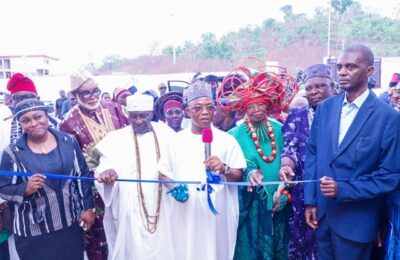On the 27th August, 2025, after the commissioning of Chief (Mrs.) Folashade Arike Ayoade’s PhD Aged Women and Orphanage Home in commemoration of her 60th birthday, I received the softcopy of a book written in her honor titled “The Girl Bamitale.”
The book was crafted by Abdul Mohammed Lawal (who gave me the softcopy), Oluwaseun Alabi Aiyejoto and Olukayode James Adelaja, Ph. D., and a foreword by H.E. Alhaji Yahaya Bello, which triggered my interest in reading the content of the book.
It spans eleven chapters with 341 pages, beginning with “Bamitale: A Name That Speaks to the Soul” and ending with “A Life Worth Celebrating.”
The opening chapter immediately immerses readers into the vibrant and deeply symbolic world of Yoruba culture, deftly setting the tone for the narrative that will unfold. It reveals how within Yoruba traditions, a name is much more than just an identifier; it is imbued with profound significance and often carries a prophetic vision. For instance, the name “Bamitale,” which translates to “stay with me” or “bring me joy,” is more than just a collection of sounds or letters. It is a heartfelt prayer as much as it is an identity, encapsulating the hopes and desires of those who bestow it.
In their work, the authors embark on an intricate exploration of the Abíkú context, approaching it not through a romanticized lens but with a pragmatic perspective that delves into the cultural reasoning behind why parents choose specific names. They emphasize the significance of names as a means to ensure survival and continuity within a lineage, artfully intertwining this cultural practice with instances of biblical renamings to explain destiny and purpose.
Early in their narrative, they establish a complex “equation” concerning the interplay of Name, Faith and Trajectory, suggesting that these elements are intricately linked in shaping an individual’s path in life, lending their study a profound depth that invites the reader to consider the power and influence of nomenclature on one’s fate.
The writer skillfully intertwines elements of spirituality with concrete facts, carefully shaping her public persona by sharing pivotal details such as her birth year, 1965, and highlighting her significant achievement as the first female Secretary to the Government of the State (SGS) in Kogi State since 2016.
The chapter wraps up with a series of introspective questions that gently prompt the reader to meditate on profound themes of life and existence, such as one’s purpose, the illuminating qualities of personal light and the interplay between Faith, Fear and Movement which encourages a deeper exploration into reader’s own beliefs and actions, guiding them to contemplate how these factors influence their journey and understanding of the world.
In Chapter Two, the writer’s tone softens into home through morning devotions, discipline that was tender rather than harsh, Ibadan’s texture, and the “test” of repeated child loss that built the family’s faith muscle. The living math was anchored on the family devotions, structure and resilience.
However, two scenes linger. First, the “face-me-I-face-you” childhood reality, which taught young Folashade to stretch beyond ceilings others accepted. Second, her mother the pepper seller, whose unpredictable income became Folashade’s first lesson in compassion; one that later shaped her policy instincts.
The writer went further to tell her education arc in brisk yet detailed: C.A.C. Primary, St. Mary’s Grammar School, A-Levels in Ilorin, B.Sc. and Ph. D. in Biochemistry (Ilorin), M.Sc. (Lagos), diplomas in German Language and Quality Assurance (Germany), and most recently, enrollment in Law. This, according to the authors, isn’t credential dumping; it’s formation.
Chapter Four shifts to her private center through her ordination to RCCG, where prayer sits beside planning; marriage to Dr. Omisade (described as “crown” and co-architect), blessed with four children, Titilayo, Abisayo,
Ayobami and Ayomilekan and a home that functions as ballast, not a backdrop.
The next chapter recalls her corporate career before politics. The writer’s tone here was “quiet excellence.” She filtered decisions through conscience, built quality systems and made a habit of doing hard things the clean way. The authors show how walking by faith in bureaucracy means diligence, not shortcuts.
Chapter Six is the pivot, leaving the predictability of civil service for the volatility of governance. As you read, one can feel the hesitation, the prayers and then the “yes” encounters with H.E. Yahaya Bello became turning points, but the emphasis is on readiness meeting timing. My margin note here was centered on preparation, providence and opportunity. The chapter also recounts her 2016 appointment as SSG and her early test of leading in a male-dominated space.
Chapter Seven is ceiling-shattering. The Esther parallel returns (“for such a time as this”), but what stands out is her continuity in office when many thought she’d bow out. Both the outgoing and incoming governors asked her to stay. The writers insist this isn’t luck; it’s institutional trust earned through competence.
As chapter five proves she can run systems, chapter eight shows why she runs them. However, Anchored on Isaiah 1:17 and James 1:27, it presents her habit of mobilizing care for widows, orphans and the under-resourced. The equation is blunt yet beautiful through power + and compassion.
Chapter Nine pulls the lens global. Invitations abroad are not framed as escape but as extension of local credibility. The wrestle between staying and going is settled by prayer and purpose.
In chapter Ten, the book feels like a masterclass, turning the mirror on us with reflective prompts; Will you let your light shine? Will you lead with kindness? Will you rise after setbacks? These distilled principles remind readers that true leadership is stewardship.
The final chapter of the book, poignantly titled “A Life Worth Celebrating,” skillfully weaves together the various narrative threads that have been meticulously built throughout the story. It emphasizes how Legacy and Lives Touched form the foundation of this celebratory conclusion.
Overall, the book presents itself as a manuscript heavily influenced by deeply-held values and ethical considerations, offering a narrative that resembles a memoir far more than it does a collection of political gossip or mere anecdotal musings about public affairs.
The tone throughout is warm, endearing and steeped in scriptural references, inviting readers to reflect deeply on the themes explored. Its foreword, sets the stage by framing the essence of leadership as a journey of transforming lives and positively impacting those around us, rather than simply accumulating power and control which invites reader to engage with a message of hope and introspection.
In explicit terms, the authors argue that titles don’t confer purpose; rather, purpose confers titles. They show how early hardship birthed public compassion, how faith remains the control variable in her story and how excellence at home and work is not contradiction but calling.
The book proves its case, one chapter at a time, especially if your own drive needs recalibrating to character, competence and compassion.
If you need softcopy DM via 08136418375
— Abdulkadir Bin ABDULMALIK
Kogi State.




